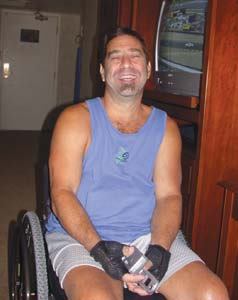The family of a drowning victim has filed suit against Hilton Hotels Corp., citing its failure to comply with the Virginia Graeme Baker Pool and Spa Safety Act.
On July 30, Bill Stock was swimming in a man-made lagoon at the Hilton Hawaiian Village Beach Resort & Spa in Honolulu. Stock had been a paraplegic since 2000, when a viral infection went to his spinal cord. He swam regularly as a form of therapy.
According to court documents, Stock’s left foot and leg became trapped on a large suction grate and it took three adults to free him.
He died the next day.
Attorneys are trying to determine who was responsible for the circulation system.
The body of water is not a traditional swimming pool, but a 5-acre, man-made lagoon in which ocean water is recirculated. According to the suit, the drain on which Bill Stock became stuck was the sole outlet carrying water back to the ocean.
The 8-foot-long grate stood vertically, and the top of it was close to the water’s surface, said Mark Davis, an attorney with Honolulu-based Davis Levin Livingston. Rocks were placed on the top and two sides of the drain, almost encasing it in a small cave. This may have increased the danger by intensifying any vortexing effect and making it more difficult to free Stock once he was pinned, said Loretta Sheehan, who also represents the Stocks.
The complaint also stated that the circulation system moved 15,000 gallons per minute, all of it flowing through the grate. “One of the witnesses said the drain is powerful enough that there is a little eddy and current in this big lagoon that literally kind of draws you toward it,” Davis said.
While the victim’s leg and foot did not seal the large grate, attorneys believe a vacuum was formed anyway because parts of the drain were blocked by debris.
“There are fish pinned up against the drain, and some trash,” Davis explained. “The fact that [parts of] the drain were blocked would make the force of the pump even greater on those areas that were exposed.”
The complaint lists many charges, including negligence, wrongful death, failure to protect and violation of the VGB Act.
The Hilton declined to comment.
For their part, local industry members hope the suit convinces noncompliant owners and operators to adhere to the law. “A large number have been dragging their heels,” said Lee Boren, president of Honolulu-based AquaBlue Pools Inc. “I’m sure it’s going to stir people to the point where … they’ll do something. This makes it a reality.”
Now that the Consumer Product Safety Commission has begun inspecting pools for VGB compliance (see related article), Boren wonders if they will target Hawaii. To his knowledge, no inspections have taken place on the islands.
The first VGB-related lawsuit was filed in June. In that incident, a man drowned in a Pittsburgh health-club pool, though the circumstances are still under investigation.




